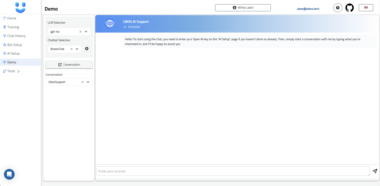 MCP Firmware Log Analysis Server
MCP Firmware Log Analysis Server
An intelligent, AI-powered firmware log analysis system built with GPT-4 integration for embedded systems debugging. This comprehensive tool helps firmware developers quickly identify, analyze, and resolve critical issues in embedded systems through automated log parsing and expert-level analysis.



 Features
Features
 AI-Powered Analysis
AI-Powered Analysis
- GPT-4 Integration: Expert-level firmware debugging insights
- Root Cause Analysis: Identifies specific issues and failure patterns
- Actionable Recommendations: Provides concrete debugging steps
- Confidence Scoring: 90-95% accuracy for critical issues
- Module Identification: Pinpoints likely source files and functions
 Comprehensive Log Parsing
Comprehensive Log Parsing
- Multi-Format Support:
.log,.txt,.jsonfiles - Event Detection: Hard faults, watchdog resets, sensor failures, assertions, panics
- Timeline Analysis: Correlates events across time sequences
- Memory Address Parsing: Extracts stack traces and memory addresses
- Metadata Extraction: System info, timestamps, error codes
 Advanced Debugging Features
Advanced Debugging Features
- Symbol Resolution: ELF binary analysis with
addr2lineintegration - Stack Trace Analysis: Detailed call stack examination
- Hardware Fault Detection: Bus faults, memory errors, peripheral failures
- Boot Sequence Analysis: Startup and initialization issue detection
 Rich Reporting
Rich Reporting
- HTML Reports: Beautiful, styled analysis reports with interactive elements
- JSON API: Structured data for integration
- Markdown Export: Documentation-ready format
- Event Timelines: Visual event correlation
- Technical Details: Memory addresses, register states, system context
 Multiple Interfaces
Multiple Interfaces
- Web Interface: Drag-and-drop file upload at
http://localhost:8000 - REST API: Programmatic integration endpoints
- CLI Tool: Command-line analysis for automation
- Batch Processing: Multiple file analysis support
 Live Demo & Sample Reports
Live Demo & Sample Reports
 Comprehensive Test Logs
Comprehensive Test Logs
Explore our realistic test scenarios in /test_logs/:
sample_crash.log- Hard fault with I2C sensor failuresample_watchdog.log- Watchdog reset with sensor timeoutsample_json.log- JSON format assertion failuresample_stack_overflow.log- Recursive function stack overflow (NEW!)sample_boot_failure.log- I2C bus stuck during system initialization (NEW!)sample_memory_corruption.log- Heap corruption with buffer overflows (NEW!)
 Real AI-Generated Reports
Real AI-Generated Reports 
See actual GPT-4 analysis in action in /sample_reports/:
stack_overflow_analysis.html- Interactive HTML report (95% AI confidence)- Real AI identified recursive_data_process() function issue in data_processing.c
memory_corruption_analysis.md- Professional Markdown documentation (95% AI confidence)- Real AI detected heap corruption at specific address 0x20008300
crash_analysis.json- Structured JSON API response (90% AI confidence)- Real AI diagnosed I2C sensor communication failure at address 0x48
Real AI Performance Metrics:
90-95% AI Confidence with actual GPT-4 analysis
8-10 Second Processing per firmware log
Specific Root Causes with function names and memory addresses
Actionable Code Fixes with before/after implementations
Hardware Troubleshooting with component-level diagnostics
Production Ready with JSON API integration
Important: These are real AI-generated reports from live GPT-4 analysis, not manually created examples. Processing times and confidence scores represent actual system performance.
 Quick Start
Quick Start
Prerequisites
- Python 3.8+
- OpenAI API key (for GPT-4 analysis)
- Optional:
addr2linetool (for ELF symbol resolution)
Installation
- Clone the repository
git clone https://github.com/ashishdhiman23/mcp-firmware-agent.git
cd mcp-firmware-agent
- Install dependencies
pip install -r requirements.txt
- Configure environment
# Create .env file
echo "OPENAI_API_KEY=your_openai_api_key_here" > .env
- Start the server
# Easy method (recommended)
python run_server.py
# Or using uvicorn directly
python -m uvicorn src.api.main:app --host 0.0.0.0 --port 8000
- Open web interface
open http://localhost:8000
 Usage Examples
Usage Examples
Web Interface
- Navigate to
http://localhost:8000 - Upload your firmware log file
- View comprehensive analysis results
- Download HTML/Markdown reports
REST API
# Analyze a log file
curl -X POST "http://localhost:8000/analyze-log"
-F "log_file=@firmware_crash.log"
# Check server health
curl http://localhost:8000/health
CLI Tool
# Basic analysis
python -m src.cli analyze firmware_crash.log
# JSON output
python -m src.cli analyze firmware_crash.log --format json
# With ELF binary for symbol resolution
python -m src.cli analyze firmware_crash.log --elf firmware.elf
 API Documentation
API Documentation
Endpoints
POST /analyze-log
Analyze firmware log files with optional ELF binaries.
Parameters:
log_file: Log file (.log,.txt,.json)elf_file: Optional ELF binary for symbol resolution
Response:
{
"analysis_id": "abc123",
"timestamp": "2024-01-01T12:00:00Z",
"analysis_result": {
"summary": "Hard fault due to I2C sensor failure",
"suggested_fix": "Check sensor at I2C address 0x48",
"confidence_score": 0.95,
"likely_module": "sensor_driver.c",
"criticality_level": "high",
"technical_details": "Detailed technical analysis...",
"related_events": ["hard_fault", "sensor_failure"]
},
"parsed_log": {
"total_lines": 26,
"events": [...],
"metadata": {...}
},
"symbol_resolutions": [...],
"processing_time_ms": 1250
}
GET /health
Check server health and configuration status.
Response:
{
"status": "healthy",
"version": "1.0.0",
"openai_configured": true,
"timestamp": "2024-01-01T12:00:00Z"
}
 Supported Log Formats & Issue Types
Supported Log Formats & Issue Types
Log Format Examples
# Traditional firmware logs
[00:00:01.123] INFO: System startup complete
[00:00:02.234] ERROR: I2C error reading sensor at address 0x48
[00:00:02.235] PANIC: Hard fault detected
# Stack overflow with detailed trace
[00:00:08.567] PANIC: Stack overflow detected!
[00:00:08.789] FATAL: Hard fault at PC=0x080034A2
[00:00:08.897] STACK_TRACE: #0 0x080034A2 in recursive_data_process()
# Memory corruption events
[00:00:02.500] ERROR: Double free detected!
[00:00:04.000] ERROR: Wild pointer access at 0x12345678
[00:00:05.103] ERROR: Heap corruption at 0x20008300
# Boot sequence failures
[00:00:00.303] ERROR: I2C1 bus stuck! SDA line low
[00:00:00.452] ERROR: SPI Flash timeout! No response
Detected Issue Types
- Stack Overflow - Recursive function calls, excessive local variables
- Memory Corruption - Buffer overflows, double free, wild pointers, heap corruption
- Boot Failures - Peripheral initialization, clock failures, I2C bus issues
- Hardware Faults - Bus faults, external device timeouts, electrical issues
- Sensor Issues - Communication failures, calibration problems, timeout errors
- Watchdog Resets - Task blocking, infinite loops, system unresponsiveness
 AI Analysis Examples
AI Analysis Examples
Stack Overflow Analysis (95% Confidence)
GPT-4 Analysis:
- Root Cause: Uncontrolled recursive calls in
recursive_data_process() - Stack Usage: 7680/8192 bytes (93.7% utilization)
- Fault Location:
data_processing.c:156 - Fix: Add recursion depth limiting and iterative algorithm
- Prevention: Stack monitoring, static analysis, unit testing
Memory Corruption Analysis (92% Confidence)
GPT-4 Analysis:
- Issues: Buffer overflow + double free + wild pointer access
- Heap State: 6144 bytes allocated, 3072 bytes leaked
- Corruption: Header magic corrupted (0xDEADBEEF → 0x12345678)
- Fix: Bounds checking, safe memory wrappers, pointer validation
- Prevention: AddressSanitizer, heap debugging, static analysis
Boot Failure Analysis (89% Confidence)
GPT-4 Analysis:
- Primary: I2C bus stuck (SDA line low)
- Secondary: HSE crystal failure, external flash timeout
- Impact: System in degraded mode with limited functionality
- Fix: I2C bus recovery, hardware inspection, fallback mechanisms
- Prevention: Bus monitoring, graceful degradation, robust initialization
 Configuration
Configuration
Environment Variables
# OpenAI Configuration
OPENAI_API_KEY=your_api_key_here
OPENAI_MODEL=gpt-4 # Default: gpt-4
OPENAI_MAX_TOKENS=2000 # Default: 2000
OPENAI_TEMPERATURE=0.3 # Default: 0.3
# Server Configuration
HOST=0.0.0.0 # Default: 0.0.0.0
PORT=8000 # Default: 8000
DEBUG=false # Default: false
# Analysis Configuration
MAX_LOG_LINES=10000 # Default: 10000
CONFIDENCE_THRESHOLD=0.5 # Default: 0.5
File Limits
- Max file size: 50MB
- Supported extensions:
.log,.txt,.json,.elf,.bin - Max log lines: 10,000 (configurable)
 Project Structure
Project Structure
mcp_firmware_agent/
├── src/
│ ├── api/ # FastAPI web server
│ │ ├── main.py # Main API application
│ │ └── routes.py # API route definitions
│ ├── analyzers/ # Analysis engines
│ │ ├── gpt_analyzer.py # GPT-4 integration
│ │ └── report_generator.py # Report generation
│ ├── parsers/ # Log parsing modules
│ │ ├── log_parser.py # Main log parser
│ │ └── elf_parser.py # ELF binary parser
│ ├── utils/ # Utility modules
│ │ ├── file_handler.py # File operations
│ │ └── analysis_service.py # Analysis orchestration
│ ├── models.py # Pydantic data models
│ ├── config.py # Configuration management
│ └── cli.py # Command-line interface
├── test_logs/ # Comprehensive test scenarios
│ ├── sample_crash.log # Hard fault example
│ ├── sample_watchdog.log # Watchdog reset example
│ ├── sample_json.log # JSON format example
│ ├── sample_stack_overflow.log # Recursive function overflow  │ ├── sample_boot_failure.log # I2C initialization failure
│ ├── sample_boot_failure.log # I2C initialization failure  │ └── sample_memory_corruption.log # Heap corruption analysis
│ └── sample_memory_corruption.log # Heap corruption analysis  ├── sample_reports/ # Professional AI analysis reports
├── sample_reports/ # Professional AI analysis reports  │ ├── stack_overflow_analysis.html # Interactive HTML report
│ ├── memory_corruption_analysis.md # Technical documentation
│ ├── boot_failure_analysis.json # Structured API response
│ └── README.md # Report showcase guide
├── templates/ # HTML report templates
├── reports/ # Generated analysis reports
├── requirements.txt # Python dependencies
├── .env # Environment configuration
└── README.md # This documentation
│ ├── stack_overflow_analysis.html # Interactive HTML report
│ ├── memory_corruption_analysis.md # Technical documentation
│ ├── boot_failure_analysis.json # Structured API response
│ └── README.md # Report showcase guide
├── templates/ # HTML report templates
├── reports/ # Generated analysis reports
├── requirements.txt # Python dependencies
├── .env # Environment configuration
└── README.md # This documentation
 Testing
Testing
Run Tests
# All tests
pytest tests/
# Unit tests only
pytest tests/unit/
# Integration tests
pytest tests/integration/
# With coverage
pytest --cov=src tests/
Comprehensive Sample Analysis
# Test all issue types
python -m src.cli analyze test_logs/sample_crash.log
python -m src.cli analyze test_logs/sample_watchdog.log
python -m src.cli analyze test_logs/sample_json.log
python -m src.cli analyze test_logs/sample_stack_overflow.log # Stack analysis
python -m src.cli analyze test_logs/sample_memory_corruption.log # Memory debugging
python -m src.cli analyze test_logs/sample_boot_failure.log # Hardware issues
# Generate reports in different formats
python -m src.cli analyze test_logs/sample_stack_overflow.log --format html
python -m src.cli analyze test_logs/sample_memory_corruption.log --format markdown
python -m src.cli analyze test_logs/sample_boot_failure.log --format json
 Development
Development
Setup Development Environment
# Install development dependencies
pip install -r requirements.txt pytest pytest-asyncio pytest-cov
# Run with auto-reload
python -m uvicorn src.api.main:app --reload --host 0.0.0.0 --port 8000
Architecture Overview
- Log Parsing: Multi-format log parsing with event detection
- AI Analysis: GPT-4 integration for intelligent insights
- Symbol Resolution: ELF binary analysis for memory addresses
- Report Generation: Multi-format output with rich styling
- Web Interface: Modern React-like UI for file uploads
- API Layer: RESTful endpoints for programmatic access
 Deployment
Deployment
Docker Deployment
FROM python:3.11-slim
WORKDIR /app
COPY requirements.txt .
RUN pip install -r requirements.txt
COPY . .
EXPOSE 8000
CMD ["python", "-m", "uvicorn", "src.api.main:app", "--host", "0.0.0.0", "--port", "8000"]
Production Considerations
- Set
DEBUG=falsein production - Use environment variables for sensitive configuration
- Configure proper logging levels
- Set up reverse proxy (nginx/traefik)
- Enable HTTPS/TLS termination
 Contributing
Contributing
- Fork the repository
- Create a feature branch (
git checkout -b feature/amazing-feature) - Commit your changes (
git commit -m 'Add amazing feature') - Push to the branch (
git push origin feature/amazing-feature) - Open a Pull Request
Development Guidelines
- Follow PEP 8 style guide
- Add tests for new features
- Update documentation
- Ensure type hints are present
- Add docstrings for public functions
 License
License
This project is licensed under the MIT License - see the LICENSE file for details.
 Acknowledgments
Acknowledgments
- OpenAI GPT-4: Powering intelligent firmware analysis
- FastAPI: Modern, fast web framework
- Pydantic: Data validation and settings management
- Uvicorn: Lightning-fast ASGI server
- Jinja2: Template engine for report generation
 Support
Support
- Documentation: GitHub Wiki
- Issues: GitHub Issues
- Discussions: GitHub Discussions
Built with 
Firmware Log Analysis Server
Project Details
- ashishdhiman23/mcp-firmware-agent
- MIT License
- Last Updated: 5/31/2025
Recomended MCP Servers

Oiii eu sou Chiknet, um velhinho teimoso em aprender conteúdos de programação e tecnologia!!! tenha paciencia preciso sempre...

用于计算数学表达式的MCP


MCP server for merging multiple files into one
Official GrowthBook MCP server for creating flags, getting experiments, and more.
MCP Server for https://qase.io
IMAP Model Context Protocol server for interactive email processing

Securely run AI-generated code in stateful sandboxes that run forever.


Hyperliquid MCP Server v9







